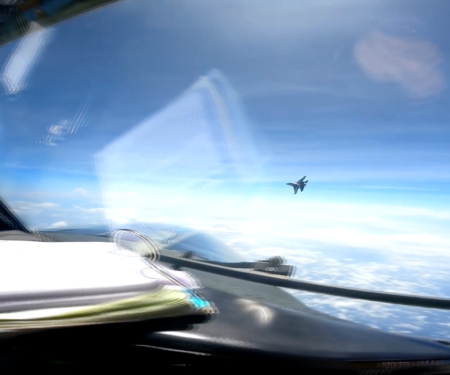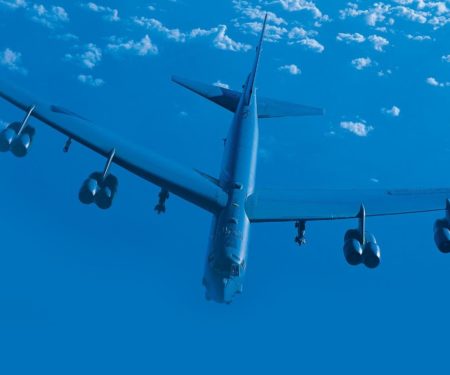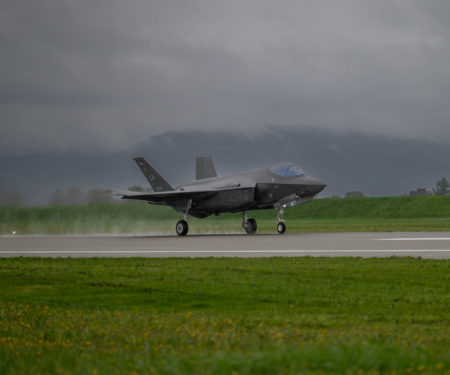B-52 Re-Engining to Get New Program Baseline in the Fall, with ‘Some’ Cost Increase
Russian-Speaking Airmen Translate Rare Account of Ukraine War Through Invader’s Eyes
In a First, USAF F-35s Join Multinational Arctic Challenge Exercise
Wives of Top Air Force, Space Force Generals Share 5 Keys to Life as a Military Spouse
Radar Sweep
Moscow Hit by Drone Attack as Russia Strikes Kyiv
Drones hit Moscow on May 30 in what appeared to be the first attack on residential areas of the Russian capital since the invasion of Ukraine. It comes weeks after an alleged drone attack on the Kremlin itself and after days of deadly Russian bombardment of civilians in Kyiv, as events far from the front lines take the spotlight ahead of Ukraine’s planned counteroffensive.
A Look at Space Operations Command’s ‘Needs List’ for AI, Machine Learning
Space Operations Command (SpOC) has created a list of its top 10 priorities for how artificial intelligence and machine learning technologies can aid the Space Force in its missions—including autonomous space-based capabilities, better operationalizing data, and more.
Major General Convicted of Forcible Kissing to Retire as Colonel
An Air Force two-star general who was convicted of abusive sexual contact in a court-martial last year will retire as a colonel, in a rare instance of knocking an officer down two ranks, the service announced May 30. Air Force Secretary Frank Kendall chose to demote William Cooley, who was previously the head of the Air Force Research Laboratory, following the officer's conviction on forcibly kissing his sister-in-law, according to a statement from Air Force Materiel Command.
Maxar Explores New Uses for Earth Observation Satellites
Maxar Technologies, which provides satellite imagery to the Defense Department and intelligence community, is considering how its Earth-facing spacecraft sensors could serve a dual-purpose in observing objects and activity in orbit. The company is one of three firms on contract with the National Reconnaissance Office, the agency that develops and operates spy satellites, to provide imagery over the next 10 years through its Electro-Optical Commercial layer program, or EOCL.
Go Deeper on Operational Imperatives
Air Force Secretary Frank Kendall has defined seven Operational Imperatives for the Department of the Air Force to work on, warning that “if we don't get them right, we will have unacceptable operational risk.” From a resilient space order of battle to the development of next-generation tactical air dominance and global strike platforms, these imperatives will define the Air Force for decades to come—Dive deeper into each one with our new “Operational Imperatives” pages highlighting all the latest news and developments on these critical efforts.
F-35 Costs Still Climbing, as Pentagon Updates the Fleet
The Pentagon’s costliest weapons program keeps getting more expensive: upgrades for the F-35 fleet will cost over $1 billion more than estimated last year, according to a new Government Accountability Office report. The Pentagon is five years into updating its fleet of F-35s—an effort known as Block 4. But the cost of the upgrades continues to climb, with an increase of $1.4 billion since GAO’s last report in April 2022, bringing the total cost to $16.5 billion.
Poland Invests in Early Warning with 2 Swedish Planes, Eyes Aerostats
Poland plans to purchase at least two Swedish early warning aircraft to complement additional tethered warning systems, but they’re perhaps not the planes some observers had been expecting. Early last week Poland’s defense minister, Mariusz Błaszczak, announced that he and his Swedish counterpart, Pal Jonson, had been in discussion, and Warsaw was “very advanced in acquiring early warning aircraft from Sweden.
OPINION: Why Manned-Unmanned Teaming Could Be the Fourth Offset for America’s Military
Rep. Rob Wittman, R-Va., is a long-time member of the House Armed Services Committee. Although best known for his expertise in naval issues, these days Wittman, now Vice Chairman of the HASC and Chairman of the Tactical Air and Land Forces Subcommittee, is looking more towards the skies. In this op-ed, he calls on his colleagues in Congress to support the “promising opportunity” in Air Force and Navy programs to team drones with piloted fighters.
DARPA Launches Initiative to Help Tech Companies Work on Classified Programs
Greg Kuperman, program manager at the Defense Advanced Research Projects Agency’s Strategic Technology Office, worries that innovations emerging from the commercial space industry will never reach potential customers in the U.S. military. A key reason for that, Kuperman told SpaceNews, is that discussions about next-generation technologies, particularly in the space sector, quickly veer into classified territory, and many commercial businesses developing these technologies don’t have security clearances.
SR-71 Blackbird: The Spy Plane That Could Outrun Missiles
On April 15, 1986, an SR-71 Blackbird screamed over Libyan airspace at 2,125 mph. The world’s fastest spy plane had just crossed Muammar Gaddafi’s so-called “Line of Death,” a disputed boundary off the coast of Libya that the dictator threatened to enforce with military action. The SR-71 climbed to 80,000 feet as its two-man crew scanned the earth below, assessing the damage inflicted by American airstrikes the previous night. Under Gaddafi, Libya had become a training ground for terrorist groups aligned with the regime’s anti-imperialist agenda, including one that the U.S. government believed was responsible for a recent bombing at a West Berlin discotheque that killed and injured American service members.





